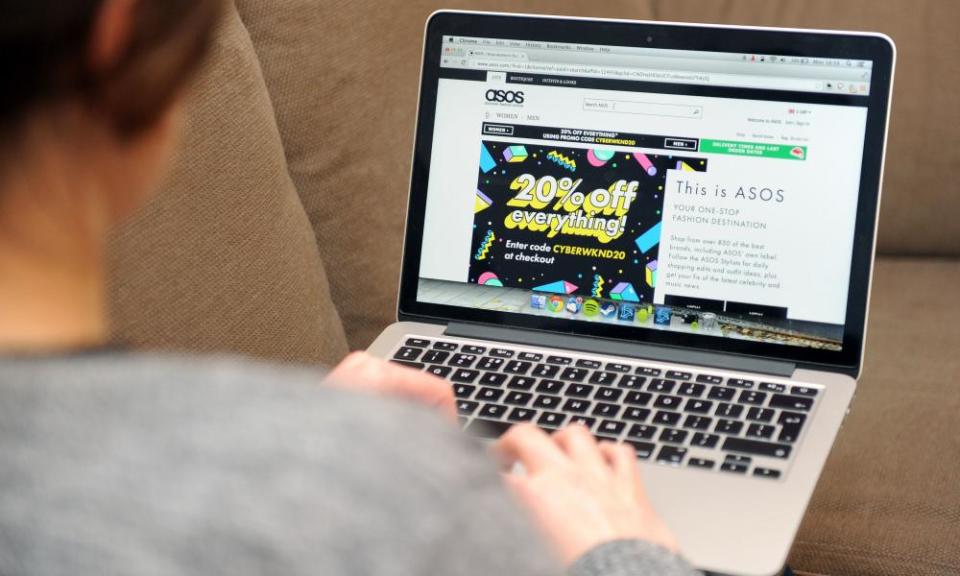Next, Asos and Amazon drop Boohoo amid Leicester factory claims

Next, Asos and Amazon have decided to pull all Boohoo clothing from sale as growing anger over workers’ pay and conditions at the company’s suppliers resulted in £1.5bn being wiped from the fast fashion brand’s value in two days.
Allegations that some factories in Leicester that sell clothes to Boohoo pay as little as £3.50 an hour and failed to protect workers from coronavirus emerged last week. On Tuesday, the three online retailers were joined by very.co.uk and Zalando, a European e-commerce giant that had €6.4bn sales in 2019, in removing Boohoo clothes from sale.
Next said the company acted last week in response to a report from the campaign group Labour Behind the Label, first reported in the Guardian, which detailed the allegations. “Next concluded there is a case for Boohoo Group to answer,” a spokesman said.
An Amazon spokesperson said: “Selling partners are required to follow all applicable laws, regulations, and Amazon policies when selling in our store. We will be suspending the sale of the brands in question.”
The news will come as a further blow to Boohoo after it was forced to announce an investigation into claims that workers at one of its Leicester suppliers were being paid well below the hourly minimum wage of £8.72. Other factories are alleged to have forced people to work throughout lockdown despite some on site having symptoms of coronavirus.
Zalando said: “We expect our partners to apply similar fundamental priorities and will distance ourselves from those who don’t.”
Boohoo, previously a £5bn company which also owns the Nasty Gal and PrettyLittleThing brands, has strongly denied any responsibility for the alleged bad practices of its Leicester suppliers. It told the Guardian on Friday: “We are working with our third-party compliance partner to further investigate the claims raised and are working with suppliers to ensure compliance.” It did not respond to a request for further comment.
Shares in the company fell almost 12% on Tuesday to 261.4p, their lowest level in nearly three months. That knocked £440m off its market capitalisation, on top of the £1.1bn wiped off its value on Monday – a drop of almost a third.
The claims have revived long-held concerns over working conditions in Leicester’s garment industry, where around 1,000 factories and small workshops make clothes, mostly for UK fast-fashion brands. An estimated 75%–80% of clothes produced in the city are for Boohoo.
The online retailers said that their relationships with the company in future would depend on the results of investigations and how the company responded to any findings.
Next said its approach was “based on trust” but that the allegations could not be ignored, and had launched its own investigation. It said it was “not pre-judging the outcome of this process and no final decision has been made” but that Boohoo items would be suspended in the meantime.
It is understood that Amazon and Asos have taken temporary measures while they await the outcome of investigations into Boohoo’s supply chain.
Zalando said it would consider restoring Boohoo items “only once all corrective actions have been satisfactorily addressed”. Very said its move was temporary and that it would “await the outcome of Boohoo’s investigation and its subsequent operational response”.
The news is “part of the reputational fallout” for Boohoo and its brands, said Aneesha Sherman, an industry analyst who estimated that revenue from other sellers amounted to 7% of the company’s income but was important as a marketing platform and signal of status.
She said there would be concerns that social media influencers who are the company’s main marketing route to its young customer base would start to desert it. “I expect to see them distancing themselves in the next few days,” Sherman said.
Former The Only Way Is Essex cast member Vas Morgan and model Jayde Pierce, moved to distance themselves from their former work for Boohoo on Tuesday. They have around 1.5m Instagram followers between them.
Others, including former Love Island star Molly Mae O’Hagan, viewed by industry sources as Boohoo’s most valuable endorsement, declined to comment when contacted by the Guardian.
Investors believe the company will ultimately right itself but are concerned in the short term, Sherman said. “There’s a lot more consideration of ESG [environmental, social and governance issues] than there was five years ago.”
Related: Fast fashion creates misery, and that's a bad look | Bidisha
Concerns about Boohoo’s supply chain emerged less than a month after the company announced a bonus plan worth up to £150m for its bosses.
On Tuesday, Umar Kamani, the son of the company’s billionaire owner, Mahmud Kamani, and founder of PrettyLittleThing with his brother Adam, tweeted “the truth will always come out” but then deleted the message. Amy Reddish, head of brand at PrettyLittleThing, posted an Instagram story with the text: “Don’t believe everything you hear or read.”
The company’s customer service replies on social media posts appeared to be struggling to catch up with the situation, meanwhile, with comments on Boohoo Instagram posts raising concerns drawing what appeared to be automated replies.
One message calling Boohoo “disgraceful” and criticising practices at its suppliers drew the response: “Please DM us in regards to this and I’ll get this looked into for you! :)”

 Yahoo Finance
Yahoo Finance 